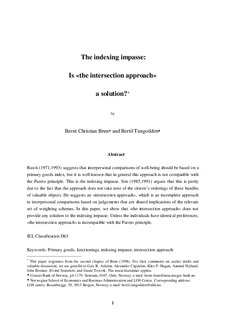| dc.contributor.author | Brun, Bernt Christian | |
| dc.contributor.author | Tungodden, Bertil | |
| dc.date.accessioned | 2006-09-06T06:31:57Z | |
| dc.date.available | 2006-09-06T06:31:57Z | |
| dc.date.issued | 1998-11 | |
| dc.identifier.issn | 0804-6824 | |
| dc.identifier.uri | http://hdl.handle.net/11250/163300 | |
| dc.description.abstract | Rawls (1971,1993) suggests that interpersonal comparisons of well-being should be based on a
primary goods index, but it is well-known that in general this approach is not compatible with
the Pareto principle. This is the indexing impasse. Sen (1985,1991) argues that this is partly
due to the fact that the approach does not take note of the citizen’s orderings of these bundles
of valuable objects. He suggests an «intersection approach», which is an incomplete approach
to interpersonal comparisons based on judgements that are shared implications of the relevant
set of weighting schemes. In this paper, we show that «the intersection approach» does not
provide any solution to the indexing impasse. Unless the individuals have identical preferences, «the intersection approach» is incompatible with the Pareto principle. | en |
| dc.format.extent | 61330 bytes | |
| dc.format.mimetype | application/pdf | |
| dc.language.iso | eng | en |
| dc.publisher | Norwegian School of Economics and Business Administration. Department of Economics | en |
| dc.relation.ispartofseries | Discussion paper | en |
| dc.relation.ispartofseries | 1998:24 | en |
| dc.subject | primary goods | en |
| dc.subject | functionings | en |
| dc.subject | indexing impasse | en |
| dc.subject | intersection approach | en |
| dc.title | The indexing impasse : is "the intersection approach" a solution? | en |
| dc.type | Working paper | en |
